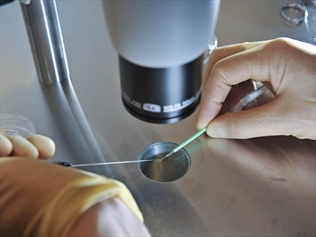
Almost half of Australian women believe that if they need IVF treatment, they’ve failed. Source: AAP
NEARLY one in two Australian women believes there’s a common perception that you have “failed” if you seek IVF treatment, according to a survey.
DESPITE an increasing number of babies being born from fertility procedures each year – currently about 12,000 – research by fertility clinic Bump found 85 per cent of women feel there’s a social stigma associated with having in vitro fertilisation treatment.
Nearly half of the 1007 women aged 25 to 44 surveyed say this is due to the perception that undergoing IVF treatment means you have “failed”. Added to this, 32 per cent believe the stigma is because women can feel responsible and guilty even when it’s their partner who has the fertility problem. Anne-Marie Pickard, 46, who had her son five years ago through IVF, said she can understand why many couples, and women in particular, would feel they’ve failed if they need IVF. “There’s probably a little bit in my subconscious brain that feels that I failed because I didn’t fall pregnant naturally,” Ms Pickard said. “But consciously I know that’s not the case.” Ms Pickard says she has felt a bit judged for undertaking IVF treatment because of her age. “As an older woman, certainly from the stuff you can go and read, I did feel a bit judged for doing IVF. “I’ve read comments along the lines of `if women weren’t putting off going and trying to have children until later in life then they wouldn’t have had that problem. “The problem was I hadn’t met my husband earlier in life; I would have loved to have kids when I was in my 20s, but it didn’t happen for me.” Since scientists from Monash University created the world’s first test tube baby in 1973, the number of babies born through IVF has skyrocketed. There are now more than 70 fertility clinics in Australia. The latest figures from the University of NSW show there were more than 61,000 IVF cycles in Australia in 2011, an increase of 7.4 per cent from 2010. Professor Bill Ledger, head of Women’s and Children’s Health at UNSW and clinician at IVF Australia, said many of his clients keep their IVF treatment a secret due to the feeling of failure associated with infertility. “I know lots of patients who don’t tell anyone at work or even their closest girlfriend that they’re doing IVF,” Prof Ledger said. “They don’t want the world to know they’re not normally fertile. “It’s that sense of abnormality, of `my sister, my friends are all having kids, why can’t I do it?’. “It really hurts, it goes deep and that’s the stigma the report is talking about.” Despite one in six Australian couples suffering infertility, there’s still the perception that falling pregnant is easy, Prof Ledger said. “If you think about a couple, they fall in love, they decide to have a child, and most people assume it will just happen like it did with mum and dad and grandparents. “So they have really happy sex, they’re in love with each other and it doesn’t work. “For most people it takes at least a year of trying before they admit they’ve got a problem.” Prof Ledger believes this feeling of failure surrounding infertility first emerges within families. “It’s having to deal with family, because mum and dad want to be grandparents, often the youngest sister has a child or a pregnancy, so that sense of failing begins within a family and it really takes courage for the couple to go to a doctor. “Before they even come to us in IVF, they’ve got this weight, this burden and this sense of being different, or unhealthy and failing.” Dr Kylie de Boer, general manager of Bump, opening in Sydney’s Mosman in September, said there’s an urgent need for an open and transparent discussion about fertility. “When we consider the social impact these misconceptions are having on couples, we know that normalising fertility treatment, by simplifying the process, empowering our clients and giving them as much control as possible is the only way forward,” said Dr de Boer.
